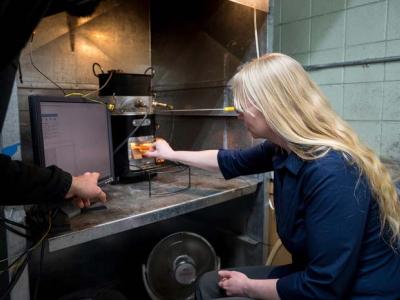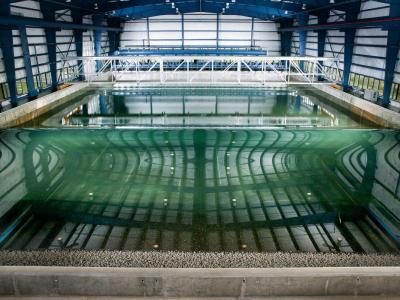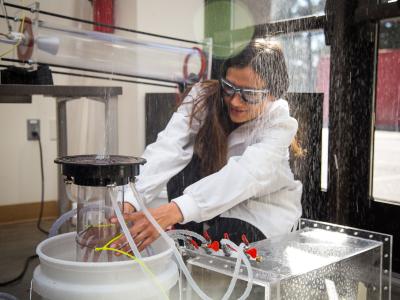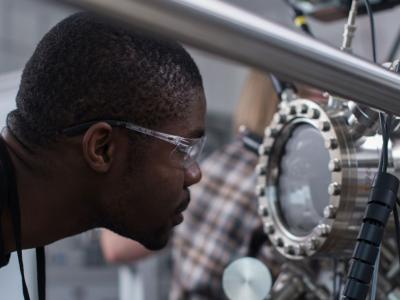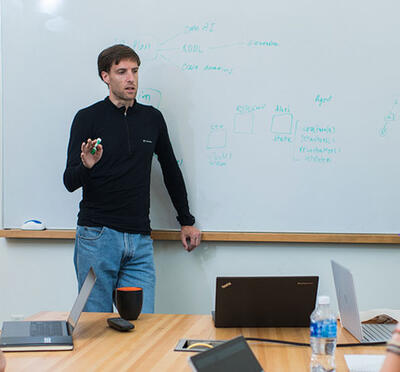Research
Oregon State Engineers strive to develop technology that is more reliable, efficient, sustainable, accessible, and equitable. If we can imagine it, we can create it!
Whether it’s improving basic technology like designing cleaner burning biomass cookstoves for low- resource and tribal communities, innovating vital industries like using advanced catalysts to create hydrogen for renewable energy, or inventing futuristic marvels like a bipedal robot to explore difficult terrain: Life takes engineering.
Today’s research is how the things we could only dream of yesterday become the things the world will depend upon tomorrow.
Land, Sea, Space and Sun
Oregon State University stands out as one of only three universities in the country with land, sea, sun, and space grant designations.
35
Career/Young Investigator Awardees
83
Research Personnel
$84.8M
Research Funding
11,128
Total Enrollment
Signature Research Areas
Advanced Manufacturing
Advanced manufacturing research in the College of Engineering is highly interdisciplinary in nature, spanning the fields of mechanical design, engineering mechanics, fluid dynamics, heat and mass transfer, thermodynamics, and materials science. Our faculty work closely with state-level collaboratives such as VertueLab and ONAMI. (Oregon Nanoscience and Microtechnologies Institute).
Artificial Intelligence
Oregon State University has a long history of excellence in Artificial Intelligence dating back to the early days of computer science. Comprising nearly two dozen faculty, the Artificial Intelligence and Robotics (AIR) group studies theory, algorithms, and systems for making intelligent decisions in complex and uncertain environments.
Clean Energy
The College of Engineering pursues several kinds of clean energy technologies, including both renewables and nuclear power. Our research groups are developing a variety of novel solar energy technologies, harnessing the power of ocean waves off the Oregon coast, improving processes for creating biomass and making wind turbines more efficient and safer for animal life. We are also the birthplace of the world’s most advanced small modular reactor.
Clean Water
Water is the foundation of life. But across the globe, water quality is being compromised as communities struggle with population growth, climate change, industrial and agricultural pollution, and other pressures. With expertise in wastewater treatment, water resources management, environmental monitoring, sustainable infrastructure. College of Engineering researchers are working to develop the solutions associated with water availability and quality.
- Clean Water Technology
- Quest for clean water
- Engineering Out Loud podcast season on clean water
- Watershed solutions
- Momentum issue on clean water
Computer Science
Computer science represents the largest research sector within the College of Engineering, with more than 50 faculty working on a highly diverse set of topics, ranging from cybersecurity and computer graphics to software engineering and human-computer interactions. The College of Engineering is also a leader in computer science education, annually conferring the most computer science degrees in the nation.
Health-related Engineering
Focuses on systems, devices, and data analysis for enhancing our understanding of health and disease. Collaborating with biology, veterinary medicine, pharmacy, and public health faculty across the university, our researchers develop new biosensors, imaging techniques, wireless medical devices, and biomaterials via state-of-the-art research in advanced fabrication, nanomaterials, electronics, and magnetics.
Materials Science
Whether the goal is improving existing processes or creating something entirely new, materials science brings together expertise in mechanical, electrical, optical, magnetic, and chemical properties to build things smarter, safer, and stronger. From transparent electronics and fiber composites to superconductors and optical thin films, College of Engineering researchers are leading the development of a new generation of materials.
- Materials science research areas
- Snake scales
- Momentum issue on materials science
- Sticky business
- Materials scientist spins sustainable products
Resilient Infrastructure
Natural hazards such as wildfires, earthquakes, tsunamis, droughts, and floods are a fact of life for all of us, and climate change is increasing the potential frequency and magnitude of many of these types of events. Researchers at the College of Engineering are working collaboratively and globally across scientific disciplines to develop solutions that will help us achieve this type of community resilience in the face of natural hazards.
Robotics
The College of Engineering is the home of the Collaborative Robotics and Intelligent Systems Institute (CoRIS). Our robotics program is recognized as one of the country’s best, where more than 25 faculty and 180 top-notch graduate students conduct cutting-edge robotics research or apply robotics applications. Faculty labs focus on more than a dozen subspecialties, including legged locomotion, human-robot interactions, and social robots.
